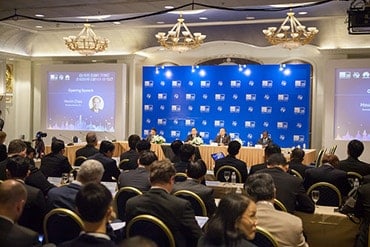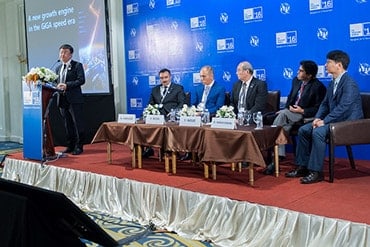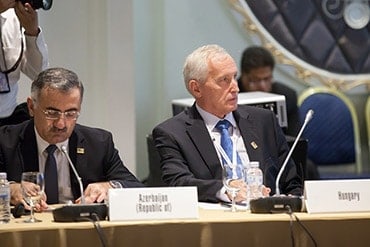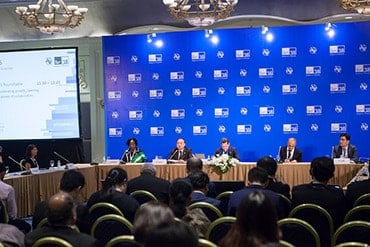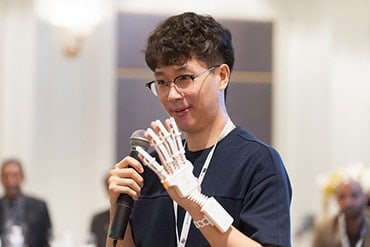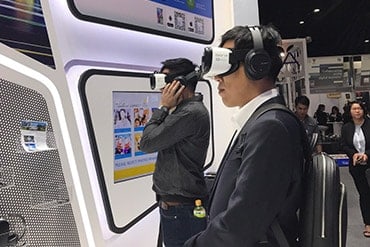
Opening the first session of the Ministerial Roundtable at ITU Telecom World as chair of the meeting, Thai DPM welcomed ministers from around the world to debate the role of government in growing the digital economy. Calling it a timely and important debate, he outlined some of the key priorities for Thailand’s governments, including improving the transparency, credibility, speed and accuracy of public services such as e-government, e-taxation and e-payments.
“The digital economy is a crucial engine for sustainable and inclusive growth to overcome the middle income trap and increase country competitiveness in the global arena,” he stated, highlighting the challenges of overcoming a still-prevalent digital divide, and the open issues of cybersecurity, capacity-building, digital literacy and digital infrastructures.
The national Digital Thailand programme will improve broadband networks and the use of digital technology for social and economic development in a sustainable and inclusive way, through PPPP – public-private-people-partnership. This people-centred approach is crucial to making the digital infrastructure easily and equally accessible throughout the country.
Partnership is key to raise awareness, promote the use of digital technology and cooperate with countries around the world. “Thailand is ready and willing to cooperate and share experiences,” the Minister declared, including in partnerships to meet the SDGs, “Let us take the journey together to benefit all of us and leave no one behind”.
ITU Secretary-General Houlin Zhao echoed the importance of collaboration in connecting the unconnected and in growing the digital economy, appealing to governments to share their national plans, strategies and experiences. He urged Ministers present in the room to be aspirational in their vision for the future, as success will meant “the world will be a much better place, with social and economic benefits that will far outweigh the investments we make.”
For H.E. Charlot Salwai Tabimasmas, Prime Minister, Vanuatu, the role of government in growing the national digital economy is to create an environment appealing to private sector investment through establishing excellent policy frameworks, reducing the currently high cost of doing business, and developing telecommunications. As a remote Pacific island state, Vanuatu is dependent on public private partnerships for economic development; the government must therefore work to ensure good services, supporting SMEs and investments. He called for a holistic approach focusing on e-government and financial services, local content, capacity-building, multi-stakeholder partnerships and collaboration, as “the digital economy is supporting the SDGs, and telecoms have a key role in this.”
The government must lead by example, as producers as well as consumers of the business that frames the future, stressed H.E. Mrs Allyson Maynard Gibson, Attorney General and Minister of Legal Affairs, Bahamas. “All our citizens have the potential to be innovators and digital entrepreneurs. How can the government spark it?” she asked.
Having been declared the first Smart Island in the western hemisphere by ITU, Bahamas can provide some of the answers. Recognizing that affordable, reliable communication is a cornerstone of national unity in such a widely-scattered archipelago, the government has worked to establish a world-class network with excellent communications over all islands and regions. This enables e-government services such as mobile units issuing passports and birth certificates locally on the islands, remote court evidence via video links, telemedicine and online business services such as incorporation of companies, annual returns and fees online – a significant saving in time and effort.
Coding is taught in all schools to enable young people to fully embrace the power of the internet, and to spur the creation of an active culture of digital entrepreneurship and innovation. Bahamas is implementing an open internet policy, removing the barriers to digital business, enabling cross-border protection of property rights to stimulate trade. These measures are designed to meet the country’s commitment to becoming a regional hub by 2020, ensuring the use of ICTS in a sustainable manner, using e-government services to encourage more efficient and competitive enterprises, and providing fully equality, 21st century jobs and improved quality of life for all in Bahamas.
Bangladesh is the ninth largest telco market in the world, explained H.E. Begum Tarana Halim, State Minister for Posts, Telecommunications and Information Technology, with a Vision 2021 set of goals to grow ICTs and telecoms through the Digital Bangladesh initiative. She stressed the need to create an enabling environment by stimulating both supply and demand sides in the industry, taking a leadership role in infrastructure development, app creation and content generation.
The government of Bangladesh acts as a gateway offering ICTs and services to its citizens, with notable success in e-health, e-education and e-agriculture. The focus is on grassroots services to local communities, delivered through a network of digital centres and e-post offices managed by local entrepreneurs and providing digital capacity training and enhancement, “setting the seed for ICT-based rural SMEs to grow”. Mobile digital services are increasing financial inclusion – and the largest stakeholders in tech-savvy Bangladesh are women and the young.
Future priorities centre on developing an e-commerce framework and policy to create an appropriate and effective online market. For the digital financial system to grow, it is critical to ensure investment for SMEs, access to domestic capital, combat cybercriminality, build confidence in the use of ICTs for trade and commerce – and enhance the job market in ICTS for women.
This roundtable is hugely significant, said H.E. Elmir Tofig oglu Velizadeh, Deputy Minister of Communications and High Technologies of the Republic of Azerbaijan, given the importance of state of the art technology in our lives for communication and economic relations on a global scale. The role of government in development is significant, but the business sector should also take an active part in enhancing digital technology. The digital economy does not just, however, involve technology, but also increased efficiency in organization, business, production, and the products and services it creates.
Development of ICT infrastructure is key to meeting increasing demand, trade activity and relations and increased services, unlocking huge economic value. Azerbaijan is committed to developing an internet banking payment system, continuing to grow e-commerce after its dramatic 5-fold increase over the past two years, and creating an innovation infrastructure through tech parks, industrial zones, tax and customs incentives for ICTs, and grants and subsidies for SMEs.
For H.E. Mr Sergei Popkov, Minister of Communications and Informatization, Belarus, the transition to the digital economy via the digitalization of all areas of life from trade to media, agriculture and industry is of primary importance for Belarus’s active participation in the global economic transformation. The national strategy of sustainable development for the period to 2030 seeks to develop a multi-service system of communication including digital television and mobile communications over next generation networks, increasing mobile broadband penetration to 90% and providing all basic government services in electronic form.
Belarus will work to develop smart housing; electronic trade; e-education via high speed broadband in all schools; automated traffic control systems; digital manufacturing including 3D printing and new production lines; and the transition to precise, ICT-enabled framing and agriculture. All this will be supported and enabled by creating an investment and legal environment favourable for digital technology and ICT businesses. “We will actively continue to develop modern technologies to contribute to achieving the SDGs and the Connect 2020 targets,” pledge the Minister.
For Cambodia, too, the ICT sector is at the heart of social and economic development as both driver and enabler, confirmed H.E. Mr Tram Iv Tek, Minister of Posts and Telecommunications. The core themes of economic development and open dialogue with multiple stakeholders inform the ICT industry, local and national investors inform the national strategy. Creating an enabling environment to stimulate investment in ICT infrastructure can only be achieved through cooperation between sates. The development of a knowledge-based economy requires a supportive environment for entrepreneurship to take the lead in providing services in the private sector.
“I strongly believe in the power of partnership between government, the private sector, investment communities and industry players to achieve the SDGs,” stated the Minister, where the public sector establishes an enabling policy, legal and regulatory framework, and the private sector invests to ensure efficiency and economic sustainability. Integrating ICTs in the education system and working with neighbouring countries will strengthen the digital economy and extend its beliefs.
Whilst it is undeniable that ICTs are catalysts of economic development, creating jobs, supplying services and enhancing knowledge, there are challenges to be faced, admitted HE Bruno Nabagné Koné, Minister of the Digital Economy, Cote d’Ivoire. These include the volume of resources needed for digital infrastructure, the high cost of connectivity, digital illiteracy and lack of the financial capacity needed to develop a digital financial system and payment structures.
Cote d’Ivoire’s national development plan seeks to create a self-sufficient regulatory and legal framework, establish important connectivity programmes at local community level and develop national expertise in ICTs through specialized technical training. There is no single key to unlocking the potential of ICTs, but the government is targeting increased broadband penetration, e-government services both transactional and informational, developing the banking sector and reducing as much as possible the informal economy outside of the central bank and national economy.
Collaboration is essential in order to implement the SDGs through ICTs, including international exchanges of expertise and competence, aligning national strategies, creating regulatory interoperability and developing an ecosystem that enables the private sector to supply solutions. Cote d’Ivoire is looking to collaborate with investors in the macro economic environment, and will increase global investment to 25% of GDP by 2017, at least 60% of which should come through the private sector. SMEs should be supported with financial resources and technical expertise to enable them to develop and create wealth for the country. “If we want to have effective implementation of SDGs, the minimum requirement is to implement digital sector policy which is consistent and coherent, and which increases job creation and wealth creation, and improve the population through knowledge acquisition,” concluded the Minister.
Western Samoa’s Minister for Communications and Information Technology, H.E. Mr Afamasaga Lepuia’i Rico Tupa’i, looked forward to sharing experiences and impressions with other nations on the transformation of economies through ICT innovations and applications. Samoa is tackling the challenges of a Small Island Developing State with scarce resources, remote and isolated location and scattered population by using mobile broadband as a critical infrastructure for ICT services in health, finance, commerce, education, government and tourism. Priorities are a broadband highway to connect all hospitals and schools, as well a proposed international connectivity connection funded by the World Bank and foreign investment.
Private financing is essential to improve internet connectivity, increase capacity and affordability, and exploit ICT capacity to mitigate the harmful effects of climate change. Public private partnerships will enable development, with one incentive for foreign investment policy under discussion including an offer of citizenship to all investors in the country. It is also critical to learn about digital transformation and digital expertise from other nations on a similar path, such as ITU Telecom World 2016 hosts, Thailand. As a SIDS nation, “We don’t need to reinvent the wheel, but can adopt systems from bigger countries”.
As a small, export-driven open country, Hungary has no minerals or resources, but must rely on its knowledge-based capital to trade, stated H.E. Dr István Mikola, Minister of State for Security and International Cooperation, Hungary. Given that 12% of GDP currently comes from ICTs, rising to as much as 24% when including digital technology and other ICT-related industries, it is increasingly important to grow innovative technology and develop ICT applications to promote economic and social development for all citizens.
Aligned with the Digital Agenda for Europe, Hungary’s National Infocommunication Strategy focuses on digital literacy and increasing education, “so that citizens, small enterprises or public administration officers can also understand the benefits of the digital process of development.” The policy will include providing financial support to engineers and creating high-level professional knowledge and skills in the ICT industry, in particular by stimulating interest in these areas in higher education. And a programme of modern digital entrepreneurship will encourage SMES to modernize and increase levels of digital competition.
Iran’s Minister for Information and Communication Technology, H.E. Mr Mahmoud Vaezi supports the ICT sector as an engine for growth and an enabling catalyst for development in all other sectors. “Our policy is to expand infrastructure and facilities, and enhance services with better quality, by using national resources and domestic capabilities,” he stressed. “We believe that harnessing the potential of ICT in today’s world is absolutely necessary for facilitating and stimulating investment, empowering use and creating employment in all sectors of the economy”.
Iran aims to provide 80% of all households with broadband at 20 mbps; increase broadband services to villages; concentrate national research and development on IoT, big data and cloud technologies; and provide an extensive array of e-services over the national broadband network. Of the 16bn plus euros that will be invested in the ICT sector over the next 5 years, one quarter will come from the government, and the balance from the private sector, including foreign investment and partnership.
The unique strategic location of Iran will enable it to open up new, shorter transit routes with advanced facilities and multiple border connections to augment existing links with Asia and Europe.
Vice Minister for Internal Affairs and Communications, H.E. Mr Shigeki Suzuki of Japan, highlighted three crucial steps for growing the economy. Promoting ICT access and the benefits they bring to the billions who remain unconnected is an urgent issue. Japan is committed to promoting public-private partnership initiatives, investing in quality infrastructure deployment overseas, capacity building and technology transfer. “We think this will contribute to economic growth and addressing social development in developing countries,” he said.
A transparent policy and legal framework will encourage competition and investment. To foster innovation, we need to build a business environment that allows for creativity and enables entrepreneurs and SMEs to launch new businesses, services and jobs. Big data and IoT are essential to foster innovation, but can only be achieved once the infrastructure is in place.
The free flow of information is a fundamental principle to foster international understanding; cybersecurity is critical for safe and secure use of ICTs. Japan’s NICT has developed systems for real time analysisof security incidents and network observation, which is now expanding across 15 countries in Asia. “We have to strengthen collaboration among all stakeholders at national, regional and international levels,” he urged, if we are to be successful in the digital economy.
Nigerian Minister of Communications, H.E. Mr Abdur-Raheem Adebayo Shittu, highlighted the sheer size of Nigeria with 180m people in 36 states plus the capital, making it the largest country in Africa by population. To grow the digital economy, Nigeria propose a national strategy plan implementing a fast-track e-government policy, national centres to promote and increase ICT capacity, state teams to mitigate cybersecurity threats and a range of policies to ensure bandwidth requirements including additional satellite capacity.
ICTs have an essential role to play in the diversification of the Nigerian economy as it moves away from its dependence on oil. The government has adopted an aggressive awareness programme to inform young people on the potential of ICTs. It is now focused on cost saving service delivery, economies of scale, ICT innovation and entrepreneurship and a strong emphasis on local content. Nigeria is keen to find investment partners to achieve a win-win relationship in its huge potential market, fertile ground for investment with abundant resources, an improved infrastructure, security and investor friendly policies.
Switzerland, according to Philipp Metzger, Director General of OFCOM, want to use digitalization to seize opportunities to success. Raising awareness of the opportunities that digitalization brings across all areas of our lives, and the potential of big data and online platforms, is critical to create a real enabling environment focused on specific opportunities.
Applying good governance and mitigating risks will mobilize the potential of the digital economy. “The goal is to bring stakeholders together at national and international levels,” he said, with governments, civil society and business determining the digital environment together and with “people-centered approaches and people-centered solutions”.
Combatting poverty through ICTs is part of Switzerland’s national strategy along with education and the development of skills for sustainable development. Multi-stakeholder processes and platforms at national and international levels and at events such as ITU Telecom World can provide good examples, processes and source of inspiration.
